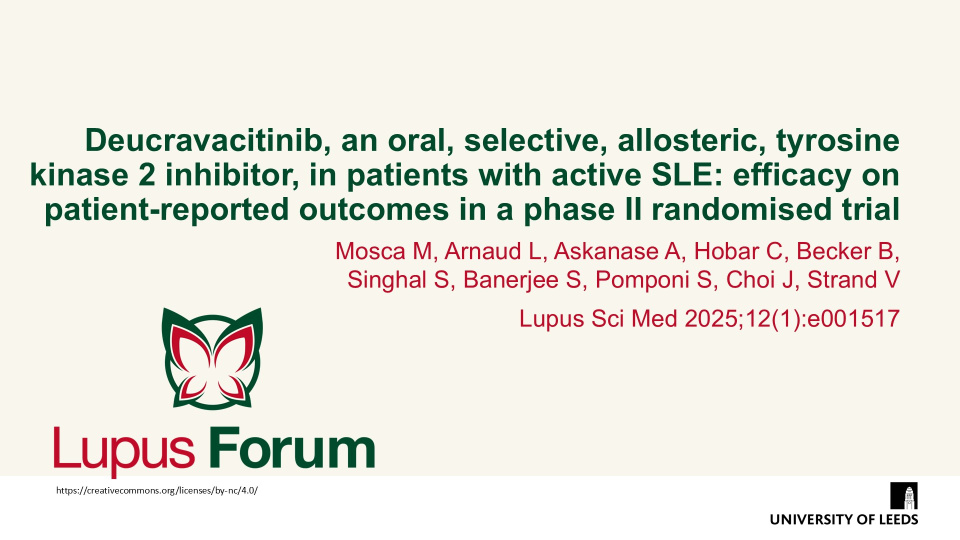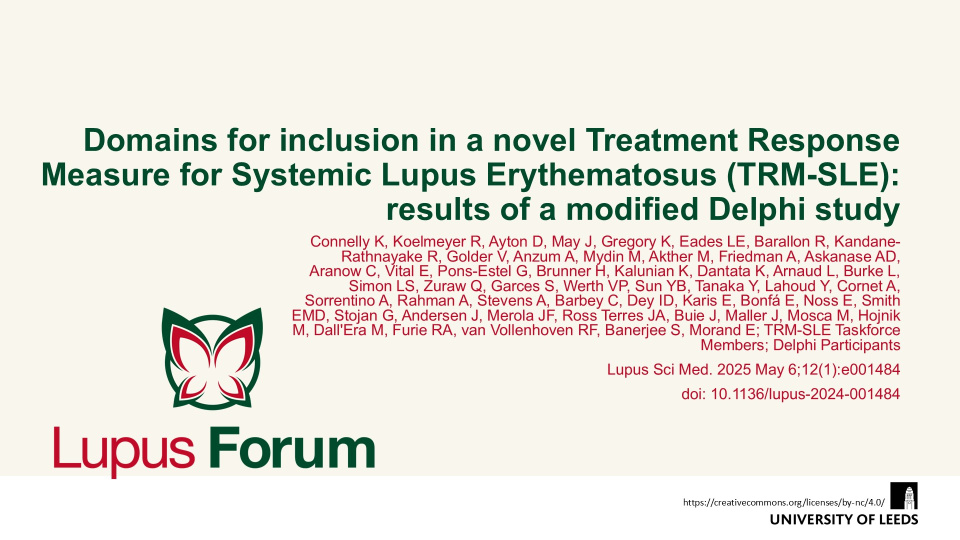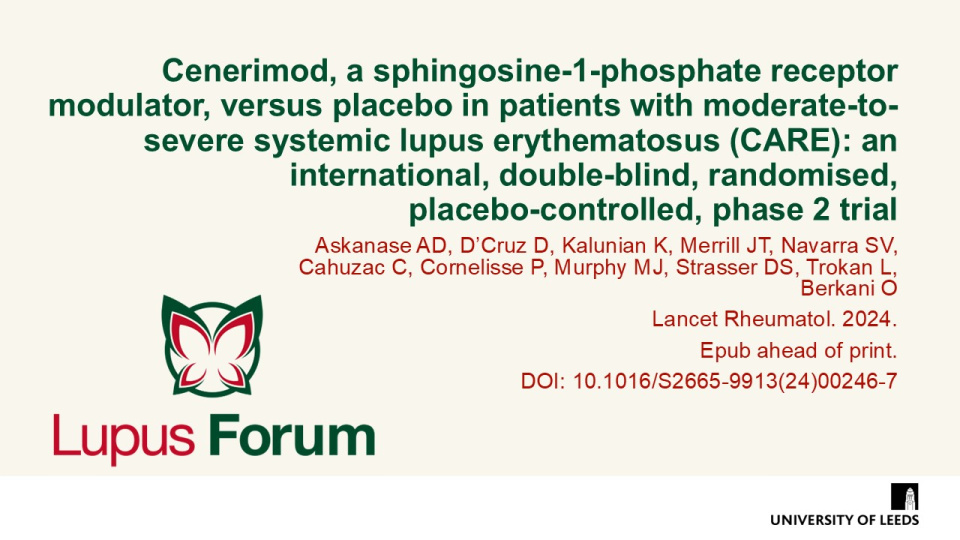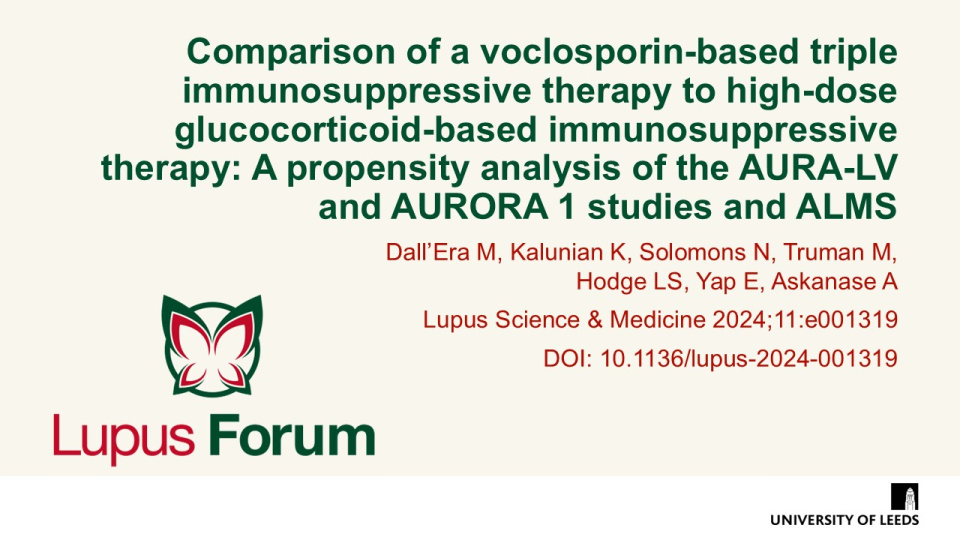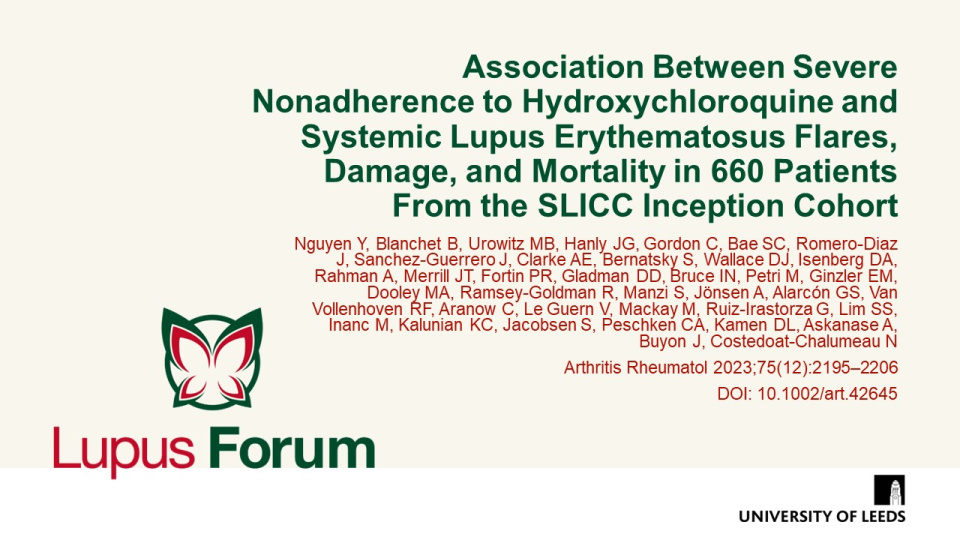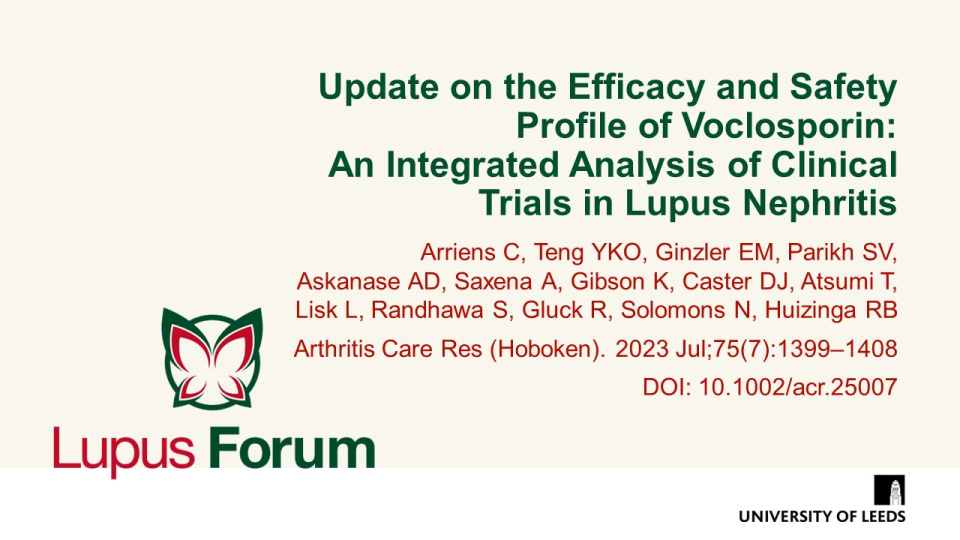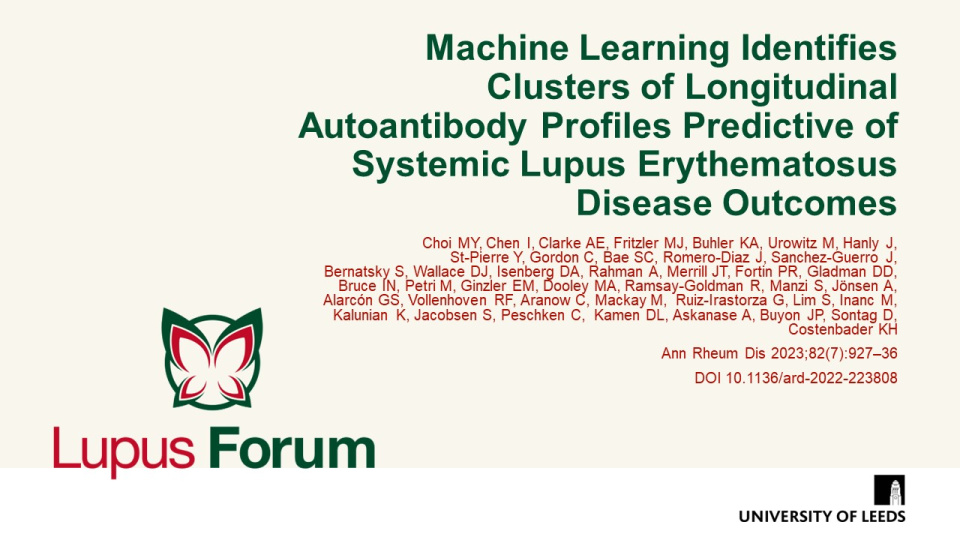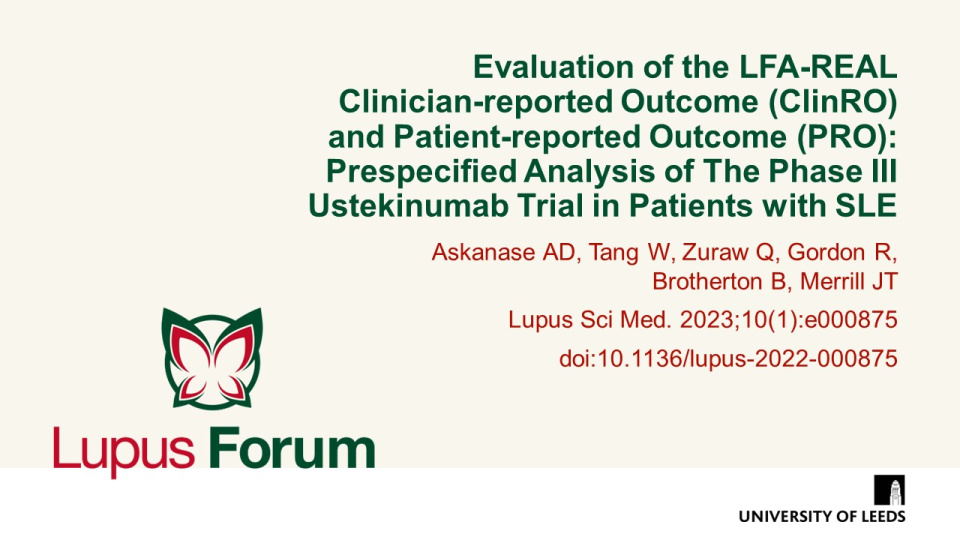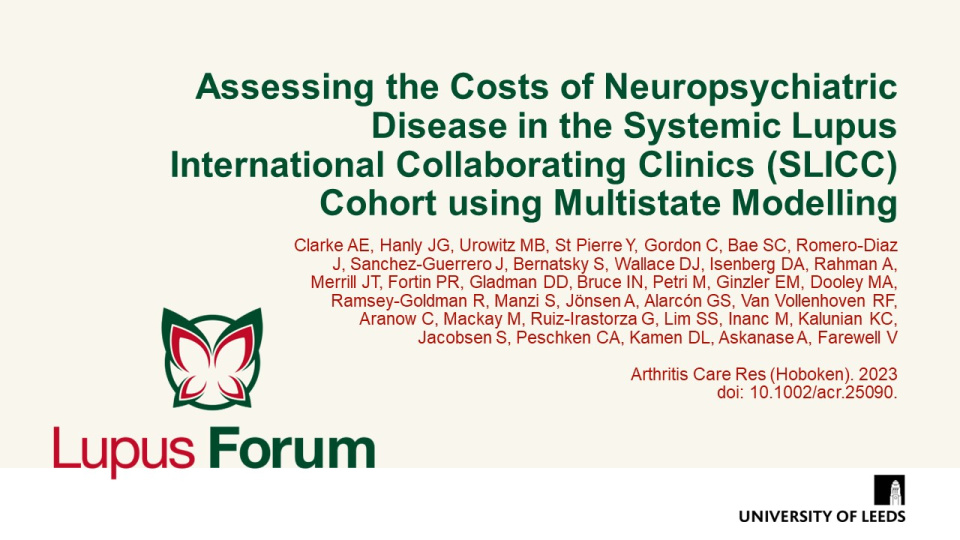Publications
Find coverage of the latest original articles on Lupus, focusing on those with data on therapeutic interventions and those that have clinical impact.
Deucravacitinib, an oral, selective, allosteric, tyrosine kinase 2 inhibitor, in patients with active SLE: efficacy on patient-reported outcomes in a phase II randomised trial
Lupus Sci Med. 2025;12(1):e001517
Patient-reported outcomes from the deucravacitinib, 48-week, phase II, PAISLEY study show that patients with SLE experienced greater improvements in pain, fatigue and health-related quality-of-life scores at Week 48 with deucravacitinib versus placebo treatment.
Domains for inclusion in a novel Treatment Response Measure for Systemic Lupus Erythematosus (TRM-SLE): results of a modified Delphi study
Lupus Sci Med. 2025 May 6;12(1):e001484 doi: 10.1136/lupus-2024-001484
Connelly, et al. use Delphi methods to achieve consensus to include eight domains of active disease to define treatment response in a novel Treatment Response Measure for Systemic Lupus Erythematosus (TRM-SLE).
Cenerimod, a sphingosine-1-phosphate receptor modulator, versus placebo in patients with moderate-to-severe systemic lupus erythematosus (CARE): an international, double-blind, randomised, placebo-controlled, phase 2 trial
Lancet Rheumatol. 2024. Epub ahead of print. DOI: 10.1016/S2665-9913(24)00246-7
Askanase et al. assessed the efficacy, safety, and tolerability of cenerimod in patients with moderate-to-severe SLE. While the primary endpoint of reducing mSLEDAI-2K scores at Month 6 was not achieved, cenerimod 4.0mg showed a significant reduction in disease activity versus placebo. Adverse events, including lymphopenia, were dose-dependent but manageable, and overall treatment was well tolerated.
Comparison of a voclosporin-based triple immunosuppressive therapy to high-dose glucocorticoid-based immunosuppressive therapy: A propensity analysis of the AURA-LV and AURORA 1 studies and ALMS
Lupus Science & Medicine 2024;11:e001319 DOI: 10.1136/lupus-2024-001319
Dall’Era et al. conducted a propensity analysis to compare voclosporin-based triple immunosuppressive therapy with high-dose GC-based regimens for active LN. Voclosporin showed fewer AEs, improved safety, and significantly reduced proteinuria over six months, suggesting a superior risk-benefit profile for patients with lupus nephritis.
Keywords:
Association Between Severe Nonadherence to Hydroxychloroquine and Systemic Lupus Erythematosus Flares, Damage, and Mortality in 660 Patients From the SLICC Inception Cohort
Arthritis Rheumatol. 2023; 75(12):2195–2206 DOI: 10.1002/art.42645
n this study, severe nonadherence to hydroxychloroquine (HCQ) was independently associated with the risk of SLE flare in the following year, early damage and 5-year mortality.
Keywords:
Update on the Efficacy and Safety Profile of Voclosporin: An Integrated Analysis of Clinical Trials in Lupus Nephritis
Arthritis Care Res (Hoboken). 2023 Jul;75(7):1399–1408 DOI: 10.1002/acr.25007
Pooled analysis of data from the AURA-LV phase 2 and AURORA 1 phase 3 trials of voclosporin in patients with active LN demonstrated that significantly more patients achieved a complete renal response at 1 year in the voclosporin than the control group (p<0.0001), with no observation of new safety signals.
Machine Learning Identifies Clusters of Longitudinal Autoantibody Profiles Predictive of Systemic Lupus Erythematosus Disease Outcomes
Ann Rheum Dis 2023;82(7):927–36 doi 10.1136/ard-2022-223808
Choi, et al. used machine clustering techniques to divide SLE patients into four distinct clusters. This could potentially be used to predict future clinical outcomes, and as benchmarks to study other SLE-related outcomes.
Keywords:
Evaluation of the LFA-REAL Clinician-reported Outcome (ClinRO) and Patient-reported Outcome (PRO): Prespecified Analysis of the Phase III Ustekinumab Trial in Patients with SLE
Lupus Sci Med. 2023 doi:10.1136/lupus-2022-000875
The Lupus Foundation of America Rapid Evaluation of Activity in Lupus (LFA-REAL) clinician-reported outcome (ClinRO) and patient-reported outcome (PRO) systems show potential as a flexible resource in the evaluation of lupus disease activity and a simple, user-friendly outcome measure for SLE studies.
Keywords:
Assessing the Costs of Neuropsychiatric Disease in the Systemic Lupus International Collaborating Clinics (SLICC) Cohort using Multistate Modelling
Arthritis Care Res (Hoboken). 2023 doi: 10.1002/acr.25090.
First study to assess the long-term economic burden of neurologic and/or psychiatric (NP) lupus in an international, multi-ethnic inception cohort, concludes that patients with new/ongoing SLE or non-SLE NP events incurred higher direct and indirect costs.


